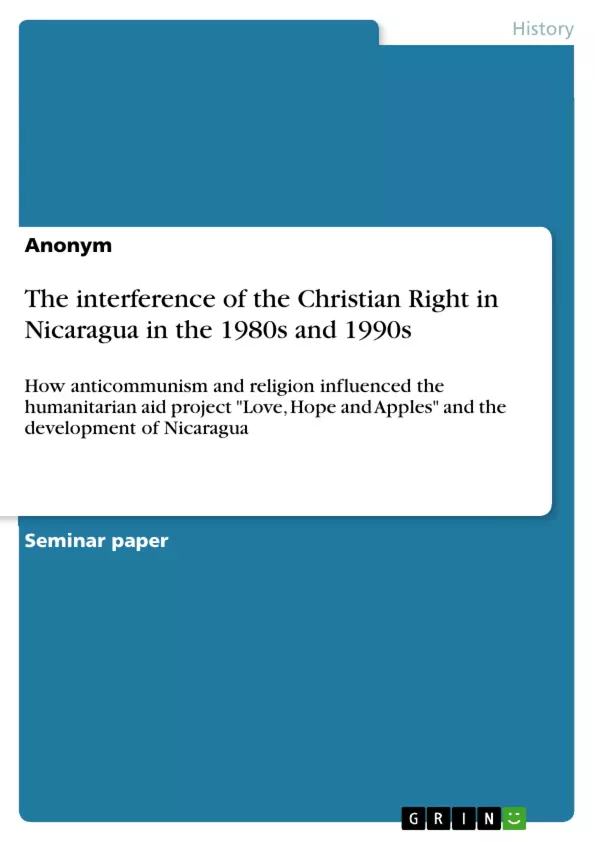The motivation for this paper is the organization "Concerned Women for America", the connection between the Christian Right and foreign policy and how they influenced the foreign policy making regarding Nicaragua in the 1980s and 1990s. To answer this question, it is necessary to answer another one first: how do the terms anticommunism, evangelicals, foreign policy and humanitarian aid work together and influence each other?
During the Cold War, the United States and the Soviet Union tried to gain as much power and influence as they possibly could. Consequently, when Communism started to spread in Central America, the USA started to get worried. The USA has a long history of interfering with matters in countries in Central America, whether with missionary missions or military intervention, like Costa Rica, El Salvador and Nicaragua. Especially Nicaragua, which had two US-American military occupations in the first half of the 20th century, managed to partially free themselves of US-American influence. The revolution in the late 1970s changed their relationship again. This revolution resulted in a Civil War – which was promoted from outside powers – in the 1980s and in a communist dictatorship.
What “promoted from outside powers” actually means, is, that powers like the USA or other organizations were not only interested in the situation of Nicaragua, but influenced the developments and the outcome. The 40th President of the USA, Ronald Reagan, took actions, which changed the political situation in Nicaragua. He does not only play a crucial part in this paper, because he was the current President at that specific time, but also because he, as an individual, choose to interfere in the Nicaraguan Civil War.
Another phenomenon of that time was the rise of the evangelicals as a political movement, who tried to influence not only politics in the USA, but also outside of it. This phenomenon was at first close with the democratic President Jimmy Carter, but he turned out to be a disappointment for the evangelicals. After Carter, they started to have closed ties with the Republican party, counting back to Ronald Reagan. The Christian Right organization Concerned Women for America started a humanitarian aid program in 1987, with the main goal to send Love, Hope and Apples to Nicaraguan refugees in Costa Rica. It is one of the few Christian Right organizations which survived the 1990s and is still active.
Inhaltsverzeichnis (Table of Contents)
- Introduction
- Critical analysis of the sources
- The importance of Ronald Reagan for the Christian Right and the US-foreign policy in the 1980s and 1990s shown with a video from 1986
- The interest of Concerned Women for America in Nicaragua shown in a press release from 1988
- The importance of Beverly LaHaye and the humanitarian aid project 'Love, Hope and Apples' for the Christian Right shown in a letter from 1988
- The connection between Concerned Women for America and US-foreign policy shown in an article from 1989
- The 'need' for church involvement and missionary missions in a democratic Nicaragua shown in a report from 1990
- Conclusion
Zielsetzung und Themenschwerpunkte (Objectives and Key Themes)
This paper examines the role of the Christian Right organization Concerned Women for America (CWA) in shaping US foreign policy towards Nicaragua during the 1980s and 1990s. It specifically explores how the organization's humanitarian aid project, "Love, Hope and Apples," was influenced by anticommunist sentiment and religious beliefs. The paper aims to answer the question of how anticommunism, evangelicalism, foreign policy, and humanitarian aid intertwined to influence US foreign policy decisions concerning Nicaragua.
- The impact of the Christian Right on US foreign policy
- The role of anticommunism in shaping US foreign policy
- The influence of evangelicalism on US foreign policy
- The connection between humanitarian aid and political objectives
- The case of Nicaragua as a site of Cold War tensions and US intervention
Zusammenfassung der Kapitel (Chapter Summaries)
- Introduction: This chapter provides context for the paper by discussing the historical relationship between the United States and Central America, particularly Nicaragua. It introduces the concept of Cold War rivalry and its influence on the Nicaraguan Civil War, highlighting the role of external powers like the US in shaping events. The chapter also introduces Concerned Women for America (CWA) and its involvement in humanitarian aid to Nicaraguan refugees.
- Critical analysis of the sources: This section analyzes various sources, including a video from 1986 featuring Ronald Reagan, a press release from Concerned Women for America, a letter by Beverly LaHaye, an article by Jim Guirard, and a report by Jim Woodall. It examines how these sources illuminate the connection between the Christian Right, US foreign policy, and humanitarian aid efforts in Nicaragua.
Schlüsselwörter (Keywords)
This paper focuses on the interplay of key themes such as the Christian Right, anticommunism, evangelicalism, foreign policy, humanitarian aid, Nicaragua, Cold War, US intervention, Concerned Women for America, and "Love, Hope and Apples." These themes are explored through a critical analysis of primary sources, drawing connections between religious beliefs, political objectives, and humanitarian actions in the context of the Nicaraguan Civil War.
- Quote paper
- Anonym (Author), 2023, The interference of the Christian Right in Nicaragua in the 1980s and 1990s, Munich, GRIN Verlag, https://www.grin.com/document/1487233



